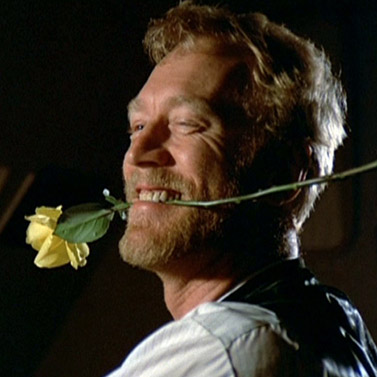Death by water (8/28/06)
____________
Steppenwolf. [Fred Haines, 1974.]
A relatively straighforward attempt at a cinematic translation of the Hesse novel — in which the protagonist, an overserious and [therefore] chronically depressed intellectual in his late forties, is introduced to the Weimar equivalents of sex, drugs, and rock and roll, and some flashy shit Hesse picked up in analysis with Jung about the fundamental multiplicity of the personality — flawed by very imperfect dubbing, not especially imaginative cinematography, and unusually inept attempts at hallucinatory surrealism which [having been shot in video, which was then probably supposed to look avant garde] have dated very badly and now look unforgivably cheesy. [It’s an interesting question whether modern CGI would make this better or worse, but, thank you, I really don’t care to see anyone try.] — But with, admittedly, a perfect cast — the great Max von Sydow [the right man at the right age] as Harry Haller, the exquisite Dominique Sanda as Hermine, the glittering Pierre Clementi as Pablo, and the suitably voluptuous Carla Romanelli as Maria — some amusing animation a la Terry Gilliam to illustrate the Treatise on the Steppenwolf, and at least one ingenious bit of pantomime between Harry and Maria to act out their argument about what he’s going to do after he comes home and finds her waiting in his bed.
Above and beyond the obvious protest that no great novel has ever made a decent movie [and no great movie has ever been made from any other than a bad novel], the particular problem that I have with this is, of course, that I know the story by heart [having read it two or three dozen times] — and, more to the point, it is, literally, the story of my life, page for fucking page, note for fucking note — and it is, accordingly, impossible for any cinematic rendition of it to satisfy me.
But then I have to pause and ask myself what this reminds me of; and it is, of course, Harry’s own reaction [not badly rendered by von Sydow here] to what he considers an offensively bourgeois portrait of Goethe which decorates the parlor of an erstwhile colleague who has sold out to the forces of reaction — a kind of tantrum, a sudden explosion of repressed feeling on the part of a fundamentally impatient man who has grown unspeakably tired of disguising his contempt for, his despair at, the folly of the fallen human world around him — an overreaction for which Hermine quite rightly takes him to task, and which motivates, in part, the lecture he receives from Mozart, representative of the artistic Immortals, on the necessity of being able to separate signal from noise: of being able to hear the music, say, of Handel, through the static and distortion of a radio broadcast; of being able to sense the divinity that shapes our ends, rough-hewn though we inevitably must find them. And to learn to laugh then at human folly; beginning with the folly that you find within yourself. — So, sure enough, the movie isn’t all that good. But if you listen closely, you can hear Hesse in it. And after all, that doesn’t suck.
____________Get Kraken (7/21/06)

